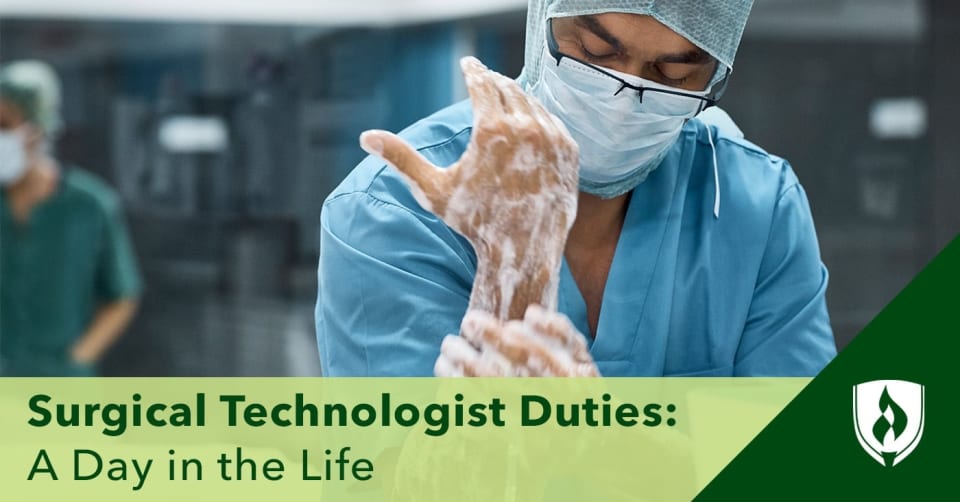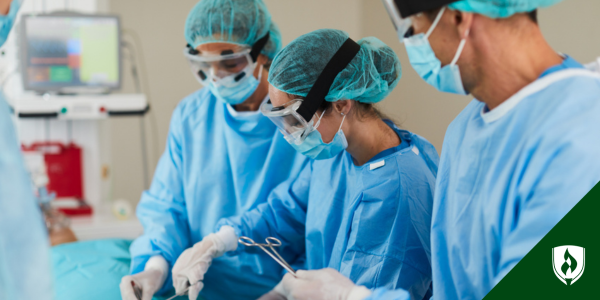
When you envision an operating room, you probably conjure up images of a surgeon with those blue gloves, a patient on the table, maybe a perioperative nurse and some sterile drapes. But doctors and nurses aren’t the only important individuals in an operating room (OR) when a patient’s life is on the line.
Surgical technologists also play a valued role in the OR as they assist with lifesaving procedures. “Even though surgical technologists are not well known as part of the surgery team, we are the backbone of surgery,” says Jonathan Fillingane, surgical technologist at Scripps® Mercy Surgery Pavilion.
This often-overlooked position in the medical field is responsible for some pretty important work. Anyone intrigued by the idea of working in the OR, but isn’t interested in medical or nursing school, may find their match in a surgical technologist career. To help you get a better feel for what this role entails, we’ve asked surgical technologists to help paint a picture of what their day-to-day work looks like.
What does a typical day for a surgical technologist look like?
It’s evident that these medical professionals are a vital part of the OR team, but the question remains: What does a surgical technologist actually do?
While the specifics will vary depending on setting, procedures being performed and the preferences of the surgeon, you can generally expect the day-to-day duties of a surgical technologist to go as follows:
- Prepare a sterile processing area
- Review the supply list and the surgeon’s preferences
- Pass necessary tools and instruments to surgeon
- Assist surgeon as needed
- Review count of sponges, needles and other materials prior to surgery’s end
- Apply bandages to patient and assist in transporting them from operating room
- Remove tools and surgical instruments for sterilization
- Prepare and clean the operating room for next surgery
As you can see, much of their work is focused on handling the tasks that keep an operating room running smoothly.
“Like the center on a football team, the surgical tech’s job is not glamorous. But the ‘ball’ does not move without you,” explains George Forleo, surgical tech for NJ Sharing Network.
What are some typical surgical technologist duties?
Read on for a behind-the-scenes look at the surgical technologist duties that take place before, during and after a surgical procedure.
Pre-surgery duties
“On a daily basis, I begin my day by opening up the sterile processing area and making sure that the autoclaves are working properly,” Fillingane says of his position at an ambulatory surgery center.
Prior to surgery, surgical techs receive a list of supplies that will be needed for the upcoming procedure. This list also includes the surgeon’s preferences and whether they’re right- or left-handed—a detail that determines how the room will be organized.
“I check my caseload of the day by making sure that everything on the preference cards for the surgeon is pulled correctly,” Fillingane explains. While the surgical tech prepares the operating room, the nurse and anesthesia tech guide the patient onto the operating table, position them correctly and wash the skin around the area where the incision will occur.
The surgical tech’s final piece of pre-surgery preparation is to apply sterile drapes around the patient. Fillingane adds that before surgery begins, the team will pause to confirm that they have the correct information for the patient, procedure plan and any allergies to ensure there were no communication errors.
Duties during surgery
“When your patient comes in, the gears change—and so does your mentality, from relative mundaneness to a certain hypersensitivity,” Forleo says, noting that surgical techs need to be on their A-game when it’s time for the procedure to take place. “Someone could die if you make a mistake.”
Once surgery begins, a surgical technologist’s primary duties include passing surgical instruments and other tasks to assist the surgeon—things like retracting the incision site open so the doctors can better see what they’re doing.
If you’re thinking those surgical instruments just consist of scalpels and scissors, you’re in for a surprise. For their role in the OR, surgical techs need to know the names of hundreds of medical instruments. This memorization and mastery of equipment is one of the important topics covered in a Surgical Technologist degree program.
As the doctor finishes the surgery, surgical technologists will conduct a count of the sponges, needles and other materials used after each layer of closure. “This is such a vital part of the surgery, to make sure that nothing is left in the patient,” Fillingane says.
On paper, these duties may seem straightforward. But Fillingane ensures that, in reality, the order and layout of the operating room constantly fluctuates. “You may have two of the same types of surgery, but they’ll never be the same,” he says.
Fillingane goes on to explain that the adjustments and surprises keep the job interesting. Through each procedure, a great surgical tech will be thinking one step ahead rather than just waiting to be told what to do. What will the surgeon ask for next? How is this procedure going? Might there be any complications? These critical thinking and anticipation abilities are important.
Duties post-surgery
After surgery, the surgical tech applies bandages to the patient and assists in removing him or her from the operating room. They’re also a part of the team that cleans the OR after the surgery, alongside housekeeping staff and nurses. This is an important step to help lower the risk of infections.
“After the patient has left the recovery room, I take the dirty instruments to the dirty area of sterile processing so the sterile processing department (SPD) tech can then clean the instruments properly,” Fillingane says.
After that important step is completed, the surgical tech prepares for the next case. “If there is a gap in surgeries, I take a break,” he adds. “If time allows, I give breaks to other techs. If our sterile processing tech is out sick or on vacation, I fill in and make sure that all the instruments are washed and processed properly.”
It’s true that the specific surgical technology duties will vary for each healthcare facility. But maintaining a basic understanding of some of the general responsibilities can be helpful in determining whether this career path would be a good fit for you. The next step is learning what skills are needed to carry out these duties.
What skills are needed to be a surgical technologist?
A successful surgical technologist will have a healthy blend of important technical skills and transferrable soft skills. We used real-time job analysis software to analyze more than 69,000 surgical technologist job postings from the past year. This data helped us identify the hard and soft skills in highest demand for surgical tech candidates:
Top technical skills:1
- Surgical procedures
- Surgical technology
- Patient care
- Aseptic technique/sterile procedures
- Cardiopulmonary resuscitation (CPR)
Top transferrable skills:1
- Active listening
- Organization
- Critical thinking
- Time management
- Teamwork/collaboration
Why work as a surgical technologist?
Unless you have already trained to become a surgical technologist, it’s unlikely you’ve mastered the technical skills listed above. That’s just a sampling of the specialized skills and knowledge you’ll acquire in a Surgical Technologist program. But once you’ve added these abilities to your arsenal, you’ll have the rewarding opportunity to impact people’s lives on a daily basis.
“You will come across amazing success stories about how a patient recovered due to a procedure you helped make possible,” says Anthony Mareno, surgical technologist at NJ Sharing Network. “You will feel as though you were a part of the team that changed that patient’s life forever, and that is because you were!”
Is being a surgical technologist stressful?
While surgical techs don’t actually perform surgery on patients, they’re still directly involved with work that can have a massive impact on a patient’s life—particularly if something goes wrong. Doing everything you can to ensure a procedure goes smoothly can come with pressure, but that can also be a net positive.
Mareno believes it’s empowering to know that someone else is relying on you, whether it be a surgeon hoping you are anticipating their next steps or a circulating nurse waiting on you to give a correct count. “You have a great responsibility,” he emphasizes.
Another potential stressor is the fact that not every procedure is going to go exactly as planned. Fillingane believes it’s crucial for surgical technologists to be able to adapt quickly.
“A huge surprise for me was to expect the unexpected,” he explains. “There is only a basic script to the job, and it changes as situations unfold.”
Follow your calling into the operating room
If you’re intrigued by these surgical technologist duties, you may be destined to assist in the OR like Mareno says he was. “Once you get into that operating room, you will know that is where you are supposed to be,” he explains. “Being a surgical technologist will always keep you interested and wanting more.”
Learn why there is no better time than now to answer the call by visiting our article “6 Enticing Reasons Why Becoming a Surgical Technologist Is Worth It.” Still trying to decide if surgical tech is for you? Check out our other article, "Scrub Nurse vs. Surgical Tech: Decoding the Differences in the OR and Beyond".
Related Articles:
1Burning-Glass.com (Analysis of 69,228 surgical technologist job postings, Mar. 01, 2018 – Feb. 28, 2019)
Scripps is a registered trademark of Scripps Health Corporation.
EDITOR’S NOTE: This article was originally published in January 2013. It has since been updated to include information relevant to 2022. Insight from Fillingane, Forleo and Mareno remains from the original article.




